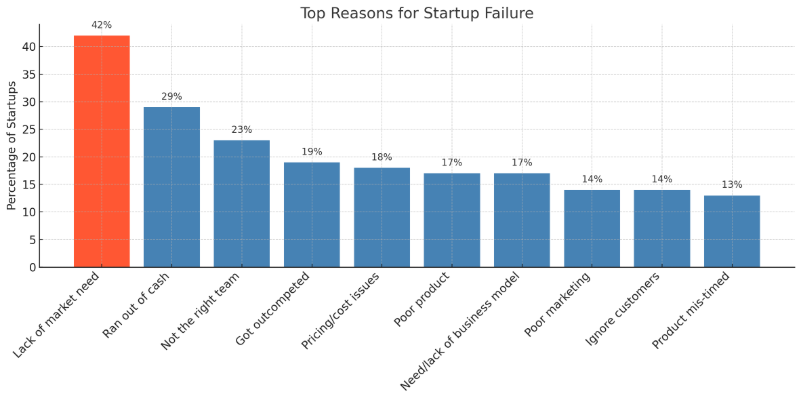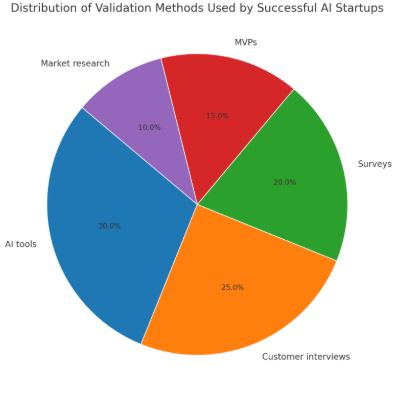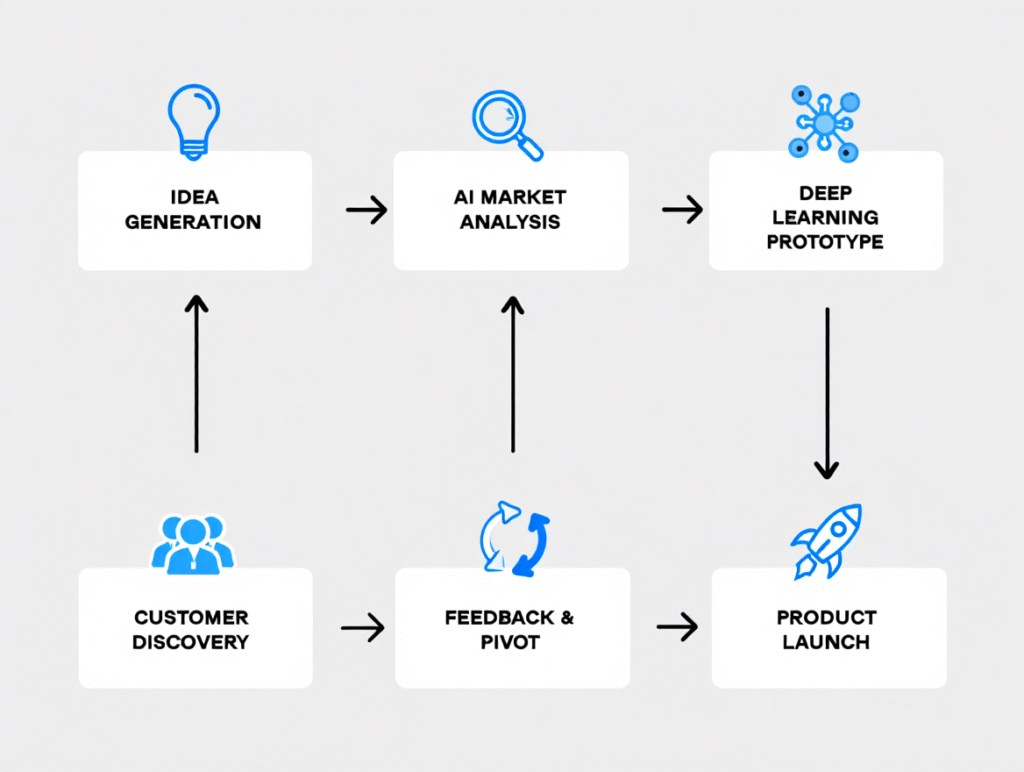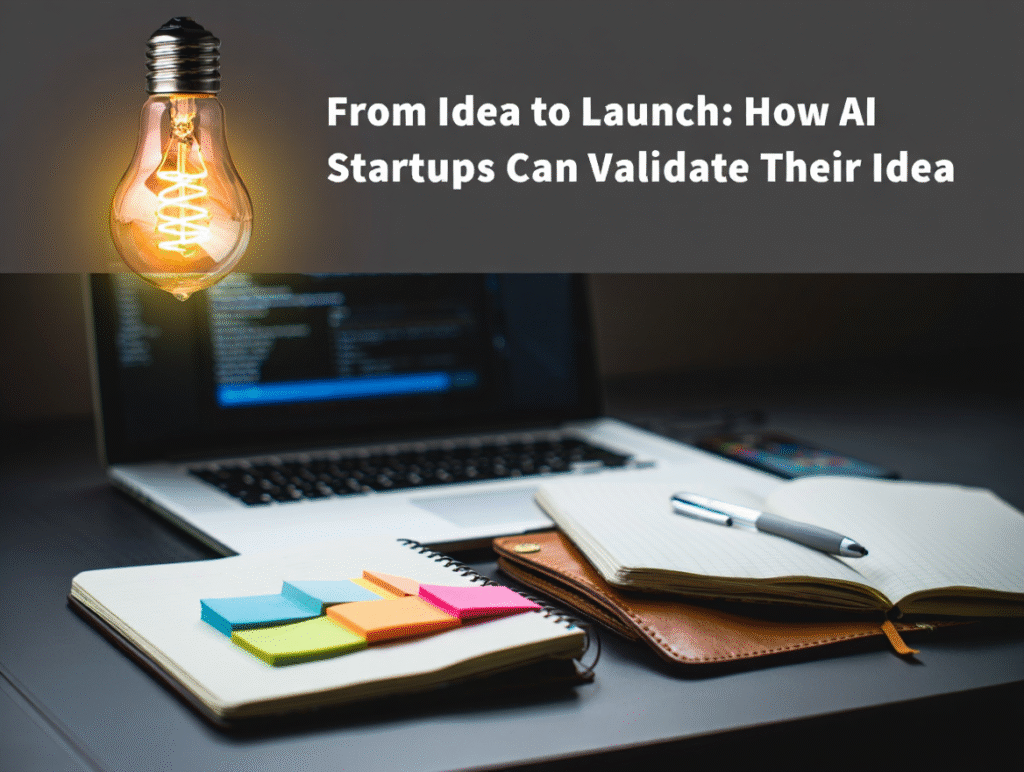Introduction
The AI startup landscape is booming, with the global AI market expected to soar from $371.71 billion in 2025 to $2,407.02 billion by 2032, growing at a 30.6% CAGR (Statista). Yet, the path to success is fraught with challenges. Research from CB Insights indicates that 42% of startups fail due to a lack of market need, a risk amplified for AI startups given their high development costs and rapidly evolving technology. Validation: confirming that your idea solves a real problem, is not just a step, but a cornerstone of success. This blog explores why validation is critical for AI startups, details data-backed validation methods, and illustrates how StartSmart’s 60-day program empowers founders to build market-ready ventures.
The Critical Need for Validation in AI Startups
AI startups face unique challenges that make validation essential:
- High Development Costs: Building AI solutions requires significant investment in data, infrastructure, and talent. Without validation, founders risk wasting resources on unviable products.
- Rapid Technological Evolution: AI technologies, such as advanced language models or generative AI, evolve quickly. Validation ensures your solution remains relevant.
- Complex Market Dynamics: AI applications must address specific pain points in industries like healthcare, finance, or education. Misjudging market needs can lead to failure.
Data Insights:
- 42% of startups fail due to a lack of market need (CB Insights).
- 35% of startups fail because they don’t solve a real problem (Failory).
- Startups that validate ideas within their network see a 29% higher success rate (Startup Genome).
- Only 18% of AI startups successfully scale beyond the initial stages (Statista).
These statistics highlight the importance of validating AI startup ideas early to ensure they meet market demands and avoid costly missteps.

Validation Methods for AI Startups
Effective validation combines multiple approaches to confirm market fit. Below are five proven methods, supported by data and real-world examples:
1. AI-Driven Validation Tools
AI-powered tools like ValidatorAI.com, Founderpal.ai, and DimeADozen.ai enable rapid analysis of startup ideas. These platforms:
- Analyze market demand, competition, and customer demographics.
- Identify potential legal or technical challenges.
- Provide actionable feedback in minutes, reducing validation time.
Example: ValidatorAI.com generates a detailed report on market size and customer needs in under 5 minutes, helping founders like Dr. Ivan Romano of Substancy structure their startup plans (ValidatorAI).
Data Insight: McKinsey reports that AI-driven validation can reduce costs by up to 83% compared to traditional methods, making it ideal for resource-constrained AI startups.
2. Customer Interviews
Direct feedback from potential users is invaluable. Conducting 15-20 interviews with target customers helps founders understand pain points, feature preferences, and willingness to pay.
Example: AssemblyAI, a speech-to-text and NLP startup, likely validated demand by interviewing businesses struggling with audio transcription, leading to $150 million in funding (Exploding Topics).
Data Insight: Harvard Business School research shows that startups engaging in early customer discovery are 2.5 times more likely to succeed.
How to Conduct Interviews:
- Identify your ideal customer profile (ICP).
- Ask open-ended questions about their challenges and needs.
- Validate assumptions about pricing and features.
3. Surveys and Market Feedback
Surveys provide broader insights into market demand and customer preferences. Tools like Typeform or Google Forms enable founders to collect data on market size and pricing sensitivity.
Example: An AI startup developing a healthcare diagnostic tool might survey doctors and patients to confirm demand for AI-driven diagnostics, ensuring alignment with market needs.
Data Insight: Only 18% of AI startups scale successfully, but surveys can identify high-demand niches, such as healthcare or fintech (Statista).
Survey Tips:
- Use concise, targeted questions.
- Distribute surveys via social media, email, or industry forums.
- Analyze results to identify trends and gaps.
4. Prototypes and Minimum Viable Products (MVPs)
Building a prototype or MVP allows founders to test their AI solution with real users. For AI startups, this might involve a basic model or demo showcasing core functionality.
Example: DeepL, a neural machine translation startup, likely tested early prototypes with users to refine its algorithms, contributing to its dominance in the translation market (Exploding Topics).
Data Insight: The Founder Institute found that startups testing MVPs are 3.5 times more likely to succeed than those that don’t.
MVP Development Tips:
- Focus on core AI functionality (e.g., a single algorithm or feature).
- Use cloud platforms like Google Cloud for cost-effective testing.
- Iterate based on user feedback.
5. Competitive Analysis and Market Research
Understanding the competitive landscape and market size is crucial. Tools like SimilarWeb or Ahrefs help analyze competitors’ strategies and identify market gaps.
Example: Glean, an AI-powered enterprise search platform, likely validated the need for better internal search tools by analyzing competitors and securing $150 million in funding (Exploding Topics).
Data Insight: PitchBook reports that AI startups with a clear competitive edge are 2.7 times more likely to secure funding.
Market Research Steps:
- Assess market size using data from Statista or Data.org.
- Analyze competitors’ strengths and weaknesses.
- Identify underserved customer segments or niches.

StartSmart’s Role in Validation
StartSmart’s 60-day program is tailored to help AI founders validate their ideas efficiently. Key features include:
- Weeks 1-2: Idea Validation:
- Founders use AI tools like ValidatorAI.com to assess viability.
- Conduct customer interviews and surveys with mentor guidance.
- Refine ideas based on market research and expert feedback.
- Mentorship and Tools:
- Access to AI and startup strategy mentors.
- Templates for GTM plans, pitch decks, and customer outreach.

Case Studies of Successful AI Startup Validation
The following AI startups demonstrate the power of effective validation:
- AssemblyAI: Validated the need for accurate speech-to-text solutions by engaging with businesses, leading to a scalable platform and significant funding.
- DeepL: Tested early translation prototypes with users, ensuring their algorithms met market demands for multilingual communication.
- Glean: Identified a gap in enterprise search through market research, securing a $7.25 billion valuation after validation.
These examples show that validation is not just about avoiding failure but about building a foundation for long-term success.
Challenges in AI Startup Validation
AI startups face unique validation challenges:
- Data Quality: AI models require high-quality data, which can be hard to source for validation.
- Technical Complexity: Validating AI algorithms often requires technical expertise.
- Regulatory Concerns: Compliance with data privacy laws (e.g., GDPR) must be considered early.
Solutions:
- Use synthetic data or open-source datasets from platforms like Hugging Face.
- Partner with technical experts or mentors, as provided by StartSmart.
- Implement compliance frameworks during validation to address regulatory risks.
Practical Tips for AI Founders
- Start Small: Test one core feature or algorithm to validate demand.
- Leverage AI Tools: Use platforms like ValidatorAI.com for quick, cost-effective insights.
- Engage Early Adopters: Identify and interview potential early customers to refine your idea.
- Iterate Quickly: Use feedback to pivot or adjust your concept as needed.
Conclusion
Validation is the bedrock of a successful AI startup. By leveraging AI-driven tools, customer feedback, surveys, MVPs, and market research, founders can ensure their ideas meet real market needs. StartSmart’s 60-day program provides a structured framework to navigate this process, offering mentorship and tools to accelerate validation. As Eric Ries, author of The Lean Startup, notes, “The biggest mistake entrepreneurs make is building something nobody wants.” Don’t let your AI startup become a statistic – validate early, iterate often, and launch with confidence.
Call to Action: Ready to validate your AI startup idea? Start with tools like ValidatorAI.com or Founderpal.ai, engage with potential customers, and consider StartSmart’s program to guide you from idea to launch in just 60 days.
Join our AI Native Venture Building Community for more insights and updates: https://chat.whatsapp.com/Jn4kBAxENCfH2Td0AvEAoL

